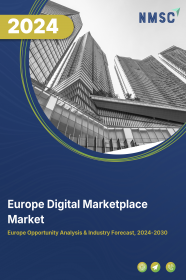
Europe Digital Marketplace Market by Platform (Desktop, Mobile, and Tablets), by Model Type (Business to Business (B2B), Business to Consumer (B2C), and Consumer to Consumer (C2C)), and by End Users (Commercial, and Personal)- Opportunity Analysis and Industry Forecast, 2024– 2030
Industry: ICT & Media | Publish Date: 27-Jun-2024 | No of Pages: 189 | No. of Tables: 138 | No. of Figures: 83 | Format: PDF | Report Code : N/A
US Tariff Impact on Europe Digital Marketplace Market
Trump Tariffs Are Reshaping Global Business
Europe Digital Marketplace Market Overview
The Europe Digital Marketplace Market size was valued at USD 96.87 billion in 2023, and is predicted to reach USD 163.67 billion by 2030, at a CAGR of 7.7% from 2024 to 2030. Digital marketplace market, also referred to as online marketplaces or digital commerce platforms, serve as virtual centers where individuals seeking to buy or sell goods, services, or information convene to conduct transactions. Operating as intermediaries, these platforms facilitate exchanges among various parties, such as buyers and sellers, within a centralized online environment tailored for effortless product discovery, purchasing, and delivery. Well-known examples of online marketplaces include prominent e-commerce platforms such as Amazon, eBay, and Alibaba, alongside service-oriented platforms such as Upwork and Fiverr.
Harnessing technology, these platforms streamline transaction processes, ensuring efficient and secure payment processing while safeguarding the financial information of all participants. Furthermore, they enrich user experiences by providing features such as customer reviews, ratings, and mechanisms for addressing transaction-related issues. Consequently, online marketplaces leverage technology to improve the overall online commerce experience, simplifying and securing transactions for both buyers and sellers. They play a vital role in today's economy by bridging the gap between businesses and consumers across geographical boundaries, thereby facilitating smooth and convenient global commerce.
Technological Innovation and Adoption Propels the Europe Digital Marketplace Market Growth
Technological innovation and adoption serve as primary drivers of the online marketplaces in Europe. With the continent being home to several tech-savvy nations and a strong digital infrastructure, there's a conducive environment for the growth of digital marketplaces. European countries are quick to adopt emerging technologies such as artificial intelligence, blockchain, and the Internet of Things (IoT), that are integral to enhancing the functionality and efficiency of online marketplaces.
Moreover, the widespread availability of high-speed internet connectivity and the increasing penetration of smartphones further contribute to the expansion of online marketplaces across Europe. As technology continues to evolve online marketplaces in Europe are well-positioned to capitalize on innovations, thereby driving growth and innovation in the sector.
Regulatory Framework and Consumer Protection Drives the Europe Digital Marketplace Market Growth
The regulatory framework and emphasis on consumer protection in Europe play a significant role in shaping the online marketplaces landscape. The European Union (EU) has implemented robust regulations such as the General Data Protection Regulation (GDPR) and the Payment Services Directive (PSD2) to safeguard consumer data privacy and enhance payment security within digital transactions.
These regulations increase trust among consumers, encouraging them to engage in online transactions with confidence. Additionally, the EU's focus on fostering fair competition and preventing monopolistic practices ensures a level playing field for businesses operating within digital marketplaces.
By providing a secure and transparent environment for both buyers and sellers, the regulatory framework in Europe supports the growth and sustainability of online marketplaces, driving increased participation and consumer trust in the online marketplace ecosystem.
Cybersecurity Threats and Concerns Regarding Consumer Trust Within Digital Marketplaces Pose Obstacles to Market Expansion
The presence of cybersecurity threats, such as data breaches and fraud, poses significant risks to digital marketplaces as it undermines consumer confidence. When consumers perceive online platforms as vulnerable to cyberattacks, they hesitate to share personal information or engage in transactions online, fearing potential privacy violations or financial losses.
This decline in trust result in reduced usage of online marketplaces and reluctance to participate in online shopping activities, that ultimately hinders market growth. Moreover, instances of data breaches or fraudulent activities damage the reputation of digital commercial platforms, discouraging both consumers and businesses from engaging in the online ecosystem.
Integration of Augmented Reality (AR) and Virtual Reality (VR) Technologies Presents a Lucrative Opportunity
The incorporation of AR and VR technologies into online marketplaces, significant opportunities arise within the market. Through the utilization of AR and VR, digital marketplaces offer users enhanced and immersive shopping experiences. These technologies enable consumers to visualize products within real-world environments, virtually try them before purchase, and engage with interactive virtual spaces.
These immersive experiences not only boost customer engagement and cultivate brand loyalty but also drive sales. Additionally, AR and VR empower businesses to effectively showcase their products by providing detailed information and personalized recommendations to users. Therefore, the integration of AR and VR technologies holds substantial potential to revolutionize the future landscape of digital commerce platforms by delivering innovative and captivating shopping experiences.
UK Dominates the Europe Digital Marketplace Market Share
The UK's dominance in the digital marketplaces market is fueled by the widespread ownership of smartphones in the region. According to data from the Pew Research Center in February 2024, 86% of the UK population possesses a smartphone. With a large segment of the population embracing smartphones, access to digital platforms becomes more widespread among consumers.
As smartphone ownership continues to rise, digital commerce platforms in the UK expand their reach and influence, offering increased convenience and opportunities for businesses and consumers alike. Moreover, in the UK, the "E-Commerce Week" campaign was launched in February 2024 to encourage 70,000 small businesses to venture into international sales through e-commerce platforms.
This initiative is supported by the UK’s E-Commerce Trade Commission, established by the Institute of Export & International Trade (IOE&IT) in June 2023. With backing from the UK’s E-Commerce Trade Commission, businesses are motivated to enhance their online presence, resulting in a surge of listings and transactions on digital marketplaces. This concerted effort is poised to significantly propel the online marketplaces market in the region.
Spain to Witness Substantial Growth in the Europe Digital Marketplace Market Trends
Spain is positioned for significant growth in the market that is attributed to the expansion of the e-commerce sector in the region, rising shifts in both consumer behavior and business strategies. According to the International Trade Administration, the number of e-commerce users in Spain is projected to increase by 25% to 37 million by 2025.
With the rise in internet penetration and the widespread adoption of smartphones, more Spaniards are opting for online platforms for their shopping requirements. This surge in e-commerce activity propelled the expansion of online marketplaces, offering a convenient and accessible avenue for both consumers and businesses to engage in buying and selling goods and services.
Moreover, the COVID-19 pandemic further accelerated this trend, as lockdown measures prompted a surge in online shopping and increased demand for online marketplaces platforms. Consequently, the digital marketplace market in Spain witnessed robust growth, with platforms such as Amazon, eBay, and local marketplaces experiencing heightened user engagement and transaction volumes. This growth trajectory is anticipated to persist as e-commerce continues to evolve and innovate, driving further expansion and opportunities in the Spanish online marketplace landscape.
Competitive Landscape
The key players operating in the Europe digital marketplace industry include Amazon.com, Inc., Walmart Inc., eBay Inc., Alibaba Group Holding Limited, Rakuten Group, Inc., Sea Limited, MercadoLibre, Inc., JD.com, Inc., Etsy, Inc., Allegro.eu, Kogan.com, SEEK, Carsales, REA Group Ltd., Airtasker Ltd. and others.
Europe Digital Marketplace Market Key Segments
By Platform
-
Desktop
-
Mobile
-
Tablets
By Model Type
-
Business to Business (B2B)
-
Business to Consumer (B2C)
-
Consumer to Consumer (C2C)
By End-User
-
Commercial
-
Personal
By Country
-
U.K.
-
Germany
-
France
-
Italy
-
Spain
-
Denmark
-
Netherlands
-
Finland
-
Sweden
-
Norway
-
Russia
-
Rest of Europe
REPORT SCOPE AND SEGMENTATION:
|
Parameters |
Details |
|
Market Size in 2023 |
USD 96.87 Billion |
|
Revenue Forecast in 2030 |
USD 163.67 Billion |
|
Growth Rate |
CAGR of 7.7% from 2024 to 2030 |
|
Analysis Period |
2023–2030 |
|
Base Year Considered |
2023 |
|
Forecast Period |
2024–2030 |
|
Market Size Estimation |
Billion (USD) |
|
Growth Factors |
|
|
Countries Covered |
12 |
|
Companies Profiled |
15 |
|
Market Share |
Available for 10 companies |
|
Customization Scope |
Free customization (equivalent up to 80 working hours of analysts) after purchase. Addition or alteration to country, regional, and segment scope. |
|
Pricing and Purchase Options |
Avail customized purchase options to meet your exact research needs. |
KEY PLAYERS
-
Amazon.com, Inc.
-
Walmart Inc.
-
eBay Inc.
-
Alibaba Group Holding Limited
-
Rakuten Group, Inc.
-
Sea Limited
-
MercadoLibre, Inc.
-
JD.com, Inc.
-
Etsy, Inc.
-
Allegro.eu
-
Kogan.com
-
SEEK
-
Carsales
-
REA Group Ltd.
-
Airtasker Ltd.

















 Speak to Our Analyst
Speak to Our Analyst




















